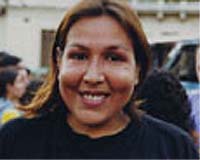
|
to Receive IGLHRC's Felipa Award
IGLHRC
She was born in the countryside of one of the country's poorest provinces -Salta- an area that is culturally and ethnically Andean (like Bolivia or Peru). Among her other identities, Lohana proudly reclaims her Coya (indigenous) blood and traditions. Like almost all trans people in Argentina, she was expelled from her family's home at age 13. She found a new home and new family with a trans community in the capital of Salta (Salta City), learning the trade that would allow her to survive for most of her life: sex work. Like many of her sisters, Lohana left Salta for Buenos Aires, the country's capital, running away from poverty, police abuse, homophobia and male chauvinism. Conditions were not better in the big city. She was imprisoned time and again; physically, sexually and verbally abused by police officers on every one of those occasions. Like other trans people, she lived in shabby hotels that charged three times more than management would charge non-trans people. There were crowded rooms, shared baths, a random supply of water and electricity. Like other trans, she was refused assistance by doctors at public hospitals and verbally harassed by neighbors while doing her shopping. In those years (before 1995), trans people were arrested an average of 3 to 5 times per week, under the Police Edicts -regulations that allowed the police to arrest people and keep them locked for up to 30 days without having to bring them before a judge. In 1995, the trans community decided to organize themselves and to fight the abuse. Lohana was one of the leaders of that movement, that started with trans and female sex workers refusing to pay bribes to police officers to avoid arrest. When the movement began, very few gay, lesbian, feminist and human rights organizations had ever met with a trans person before and many were quite reluctant to do so. Lohana and her colleagues, who had just created ATA (Argentinean Transvestite Association) organized workshops and performances, telling their stories to the most diverse audiences. As a result, the trans community and its leaders stood at the forefront of the fight for the repeal of Police Edicts, carried on by a coalition of women, young people, ethnic, gay and lesbian and human rights organizations. Lohana and her colleagues spent hours educating their peers, speaking to the public and the media, resisting arrest, training themselves to engage in peaceful resistance and beefing up on international human rights law. Victory was achieved in 1997. For many trans people it meant riding a subway or shopping at a supermarket for the first time in their lives. In the years that followed, Lohana dedicated herself to other issues that the trans community began to face, as police harassment died down. Already in her late 30s, she enrolled in night school, both to complete her education but also to set a precedent for other trans people - majorities of whom drop out of school due to harassment and discrimination. Not only did she graduate with honors, but also she managed to get the city's Council for the Rights of Children and Adolescents to start a campaign to keep trans children/teenagers in the schools or to bring back those who have already drop out. She has also worked with other institutions like the city's Ombudsman Office (on a groundbreaking survey on discrimination, violence and socioeconomic situation of the local trans communities) and the hospital that treats HIV/AIDS and STDs, where professionals were sensitized and trained in dealing with trans patients. Lohana has represented Argentinean trans communities abroad on many occasions, including the UN Conference Against Racism (Johannesburg, 2001) and the 57th Session of the UN Committee on Human Rights (Geneva, 2001). The impact of her conversations with UN Special Rapporteurs -most of who had never talked to a trans person before- contributed to the experts committing to highlight sexual orientation and gender identity issues on their reports and actually doing so. Lohana has also traveled to other countries -like Paraguay, Bolivia and Uruguay- to help trans communities to organize there. Lohana has successfully managed to transform her suffering of brutal human rights abuses at an early age into a fuel that keeps her active and committed. In the context of the most dramatic crisis that her country has ever faced, her work has increased but has also found new avenues. Lohana has drawn closer to those social movements fighting for neo-liberal policies and has now become a recognized voice in social justice organizations, in street demonstrations, the media, and even academic circles. Her articulation of racial, gender and class issues is unique and powerful. This ability emerged from her responses to the fact of her own life, empowered by the many lives she has contributed to save. She can be found everywhere: at the Foreign Office, fighting against the deportation of Peruvian trans sex workers; in a hospital, holding the hand of lonely AIDS trans persons and collecting money for their funerals. At universities she addresses students and staffs about trans lives. At demonstrations she instructs young trans and non-trans activists about how to avoid or minimize the effects of tear gas. She is bright, generous, full of humor, and fiercely in love with life. She is a role model for trans and non-trans people fighting for social, racial and gender justice in the South. ** Transvestite is the term used in Argentina for transgender and transsexual |
 Lohana Berkins will receive the International Gay and Lesbian Human Rights Commission's 2003 Felipa Award
Lohana Berkins will receive the International Gay and Lesbian Human Rights Commission's 2003 Felipa Award